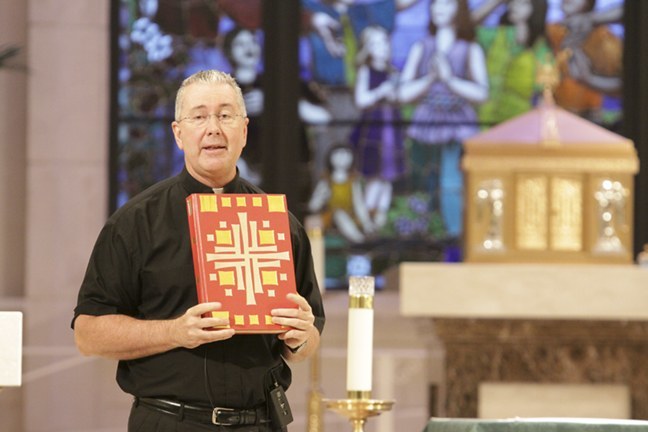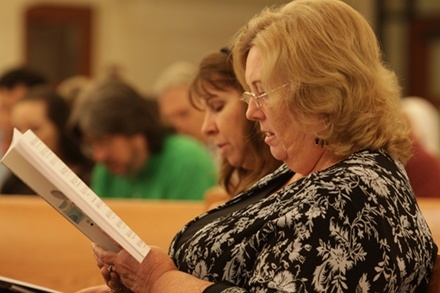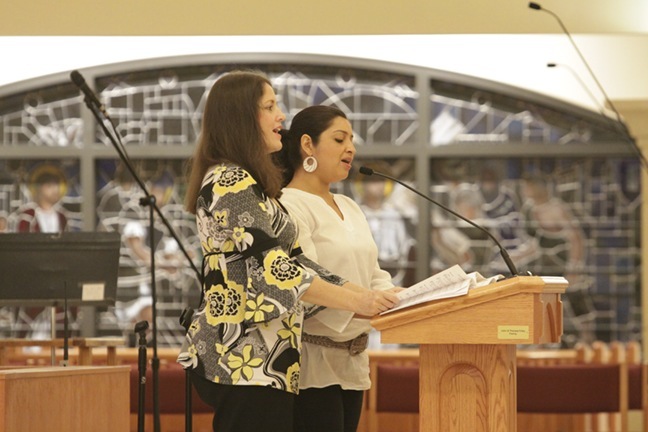By Ana Rodriguez Soto - The Archdiocese of Miami

Photographer: ANA RODRIGUEZ-SOTO | FC
Msgr. Terence Hogan delivers one of two workshops dealing with the new English translation of the Roman Missal at St. Gregory Church in Plantation. The other workshop took place Aug. 24 in Little Flower Parish in Coral Gables.
At least that�s how Msgr. Terence Hogan made it seem during one of two workshops he led this week to familiarize local priests and music ministers with the new English translation of the Roman Missal. Msgr. Hogan is rector of St. Mary Cathedral and director of the archdiocese�s Office of Worship.
�It�s going to take time to get to learn it,� he told nearly 200 people who gathered for the Aug. 23 workshop at St. Gregory Church in Plantation. �We�re going to have to use the musical pulpit for a while.�
By that he meant that it will be easier for people to learn the new wording of Mass responses if they begin by singing them, using the musical settings they already know.
Although the new English translation of the Roman Missal will not be used until the first weekend of Advent (Nov. 26-27), the U.S. bishops � and locally, Archbishop Thomas Wenski � have given permission for parishes to use some of the sung responses beginning this September.

Photographer: ANA RODRIGUEZ-SOTO | FC
Kathy Myrick, left, and Dee Layman, who help prepare the liturgies at St. Thomas Aquinas High School in Fort Lauderdale, sing the Mass responses while following the music in one of the sample books now available for parish music directors.
�Don�t go crazy trying to get those gazillion things into people�s lives. Take some basic chants. Take some basic music and apply it to the text. Don�t make it overly difficult,� he said.
He also suggested that parishes take advantage of what music and missal publishers are offering, including laminated prayer cards containing all the new peoples� responses that could be purchased and placed in every pew for parishioners to follow along during each Mass.
�I know I�m going to have my head in the book for a while,� Msgr. Hogan said, noting that the changes to the priests� prayers are much more widespread and significant than the changes to the peoples� responses. And the new prayers do not roll smoothly off the tongue in many cases because the whole goal of the new translation is to bring the English closer to the original Latin, which is the official language of the Church.
�We�re not going to use everyday language. We�re going to use theological language. We�re going to use poetic language. We�re going to use biblical language,� Msgr. Hogan said.
An example of that is the phrase �consubstantial with the Father� which will be used in the Creed.
�Be patient,� Msgr. Hogan advised. People � and priests � are not going to memorize the new words overnight.
At the same time, however, �I really think it�s going to reinvigorate� the celebration of the liturgy. �Sometimes we take things for granted,� Msgr. Hogan said. The new translation will force us into thinking, �Why do I say this? Why do I believe this?�
�People who have memorized things will just have to read the book,� said Kathy Myrick, who works in campus ministry and helps prepare the liturgies at St. Thomas Aquinas High School in Fort Lauderdale.
�The way he presented it, he made it seem so easy,� Myrick added. �If they learn the music, then when they say it, they�ll already know it.�
�I think that the changes will be easier for the young,� said Dee Layman, Myrick�s colleague at St. Thomas.
�I don�t even open up the missal,� she added, because she has all the prayers and responses memorized.
�For me, personally, it�s good, because now I have to read it. I have to think about what I�m saying,� Layman said.

Photographer: ANA RODRIGUEZ-SOTO | FC
Suzie Arsenault, left, archdiocesan music director, sings the new words of a Mass response with Dora Cardona, a choir member at St. Matthew Parish in Hallandale.


Comments from readers